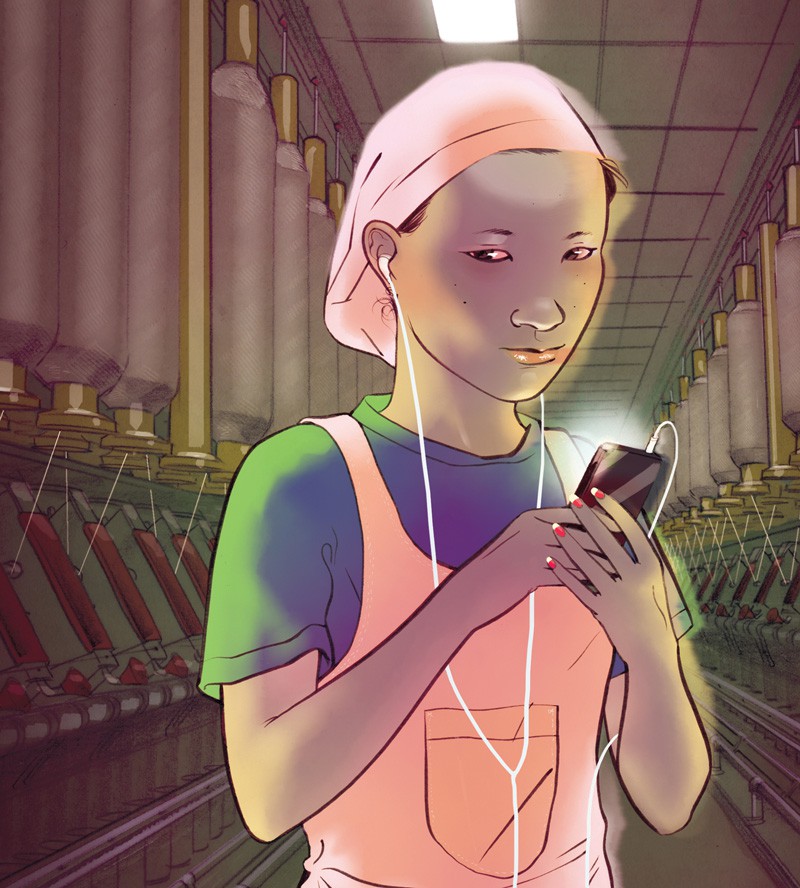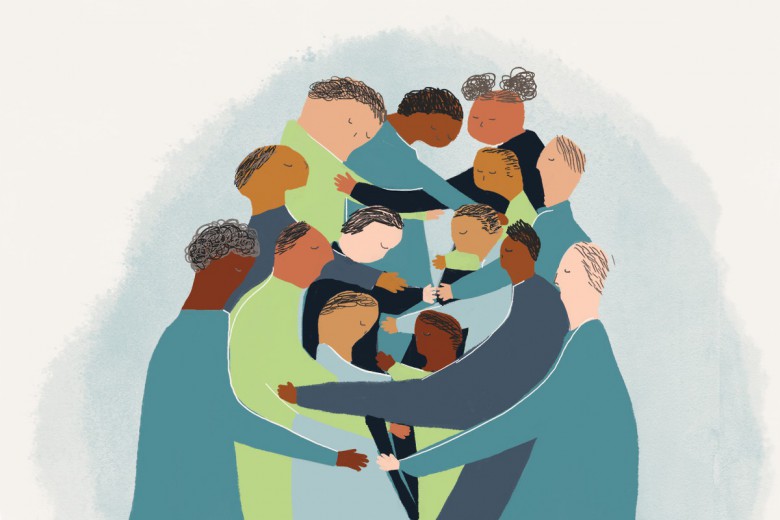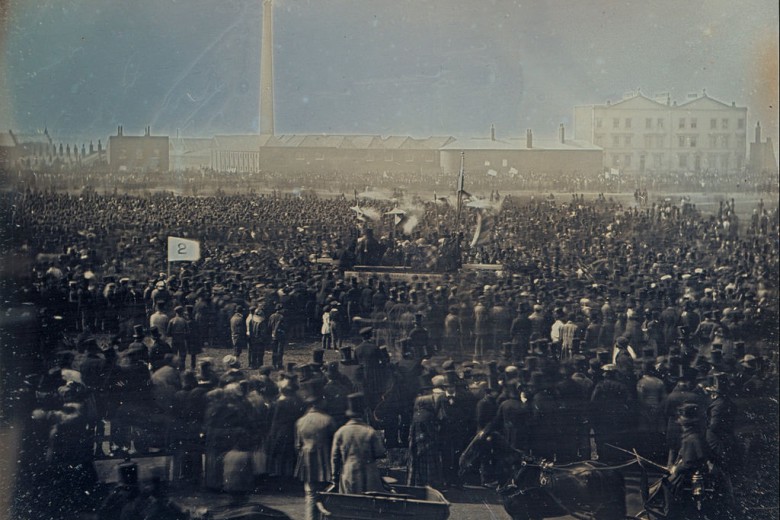
“The Internet now is what TV was 20 years ago,” says Mike Thomas, Recreation Committee Chair of the International Brotherhood of Electrical Workers Local 424. “I don’t go home and sit down and watch four hours of television. I’ll go home and spend four hours catching up on messages, chatting with friends all over the world, watching videos, reading papers, doing research on subjects of interest.”
Thomas is not alone. Recent trends suggest that Canadians are spending increasingly more time online and less time in front of the TV. According to Statistics Canada, Internet use in households with children under 18 has risen from 50 per cent in 1999 to 82 per cent in 2004. During the same time period, TV watching went down by three hours a week amongst the same age group.
This shift in people’s media habits away from top-down broadcast media like television towards more interactive network media opens up interesting possibilities for grassroots democracy and political organizing. Labour unions are increasingly taking notice, and beginning to adapt the technologies to their own uses.
In particular, social networking sites and other online innovations that facilitate user-generated content and peer-to-peer information sharing (collectively known as “Web 2.0” technologies) have changed the way people use online media, encouraging active collaboration among users in a way that our televisions never could. Union organizers, originally frightened by the security risks of the virtual world, have shifted to publicly advocating that unions make better use of the Internet. Workers may not be able to organize using their television sets. They can, however, discuss workplace issues on the web. For this reason, unions of all varieties are now making use of Web 2.0 technologies like Facebook. It’s free, it’s popular and it’s user-friendly.
But is it union-friendly?
Dave Malka, a member of the Communications, Energy and Paperworkers Union of Canada Local 777 in Edmonton, thinks so. He sees Facebook as a great tool for union organizing. “I usually sent out a lot of emails, but I think people ignore the emails, or it goes into their bulk email,” he explains. “I understand that happens with Facebook too,” he concedes, but Facebook is an additional way of getting information out, particularly to younger people and others outside the labour movement. Malka has spoken with many people he never would have reached before, he says. This has given the movement, which desperately needs to make inroads into the youth demographic and the service sector, a much-needed boost of energy.
UNITE HERE (a merger of the Union of Needletrades, Industrial and Textile Employees and the Hotel Employees and Restaurant Employees International Union) organizes many young service-sector workers. The union represents 450,000 workers across North America. UNITE HERE Canada co-director Alex Dagg says she probably first got the idea to use Facebook as an organizing tool from her 14-year-old son. “He doesn’t even talk on the phone anymore,” she says.
Since plugging into Facebook, UNITE HERE has used the site to organize young concession-stand workers and successfully recruited student organizations for a boycott campaign against a large American retailer – a boycott they settled last fall in what Dagg describes as “a huge win.” She stresses that Facebook was just one aspect of the campaign, though the other aspects she cites – their extensive email list and their website – are hardly traditional organizing methods either.
Rebecca Rose, the VP of Education at the Ryerson Students’ Union, also points to Facebook as the primary focus of her outreach efforts. “[At] university, Facebook is probably one of the most useful tools in organizing because just about everyone and their dog has a Facebook account, which means that that’s almost their primary way of communicating at this point.” Former Simon Fraser Student Society president Derrick Harder agrees. His student union discovered through an exit poll that about half the students who voted in a referendum on a universal bus pass heard about the vote through Facebook. The vote passed with over 90 per cent voting in favour of extending the U-Pass until 2011.
Facebook lets users self-identify as members of particular groups or networks (for instance a specific workplace or a university), which is very useful for organizers, points out Harder, who may not have a list of their membership or may not have the resources to reach them by other means. This is true for student unions and labour unions alike. A Facebook group can also act as a gauge of support during a campaign. You can tell which networks you’ve tapped into by looking at who has joined.
More importantly, Facebook allows members to self-organize. “Members take it and do their own thing. We’re not leading it and planning it all,” says UNITE HERE’s Dagg. Mike Thomas, who coordinates pool tournaments, bar nights and volunteer groups over Facebook, emphasizes the importance of the space Facebook has opened for grassroots organizing. “We’re organizing ourselves on Facebook within our union. And that’s the most important thing we can do in this horrific climate that unions are in in the province [of Alberta] right now. The way the government is actively seeking to destroy us, we need a way to be together. And this is what Facebook is allowing us to have without any need for infrastructure.”
“The U.S. National Security Agency is becoming increasingly interested in collecting user data off social networking sites.”
Derek Blackadder is a CUPE National representative. Outside his day job, Blackadder is the senior Canadian correspondent for LabourStart.org, an international organization that disseminates labour news over the Internet and encourages unions to make more effective use of online technologies. He believes that the utility of Facebook is its ability to attract people who are joining workplace-related groups for practical reasons. These people are from a much broader demographic than the typical under-35 Facebook crowd. With an estimated 40 per cent of Canadians on Facebook, the site is no longer just a youth phenomenon.
Blackadder gives the example of a hypothetical 50-year-old nursing-home employee who takes notice of her child using Facebook and, over a lunchtime conversation with co-workers, realizes it may be a useful way to start organizing around workplace issues. This worker probably wouldn’t have decided to join Facebook otherwise, but after observing what her kid is doing, it makes some sense. If users can participate in something relevant to their lives by joining Facebook, Blackadder says, they“˜ll do it. “It won’t matter what their age is and it won’t matter what their gender is,” he adds. “All the demographic crap just goes out the window.”
While testing out the value of Facebook for unionists, Blackadder found the social networking site does have some restrictions. He was banned from the site not once, but twice – first for adding too many friends and then for sending too many messages. What was his response? Blackadder and his friends used Facebook to campaign to get him reinstated, of course.
Blackadder says he was becoming so addicted to Facebook that the second time his account was cancelled it came as a relief. “It gave me back about an hour a day – an hour a day I now spend reading the paper and drinking the first couple cups of coffee … rather than sitting in front of my computer checking Facebook to see who of all my contacts has been doing what.”
Blackadder isn’t the only labour activist to run afoul of Facebook. Malka was also cut off from the site for sending out too many messages. He has since set up a new account attached to a separate email address.
Outside of having your account deactivated, there are other, more serious concerns. A big one is a fear of surveillance by police, government or employers. Blackadder reports that in Australia it’s standard practice when hiring people into sensitive positions or workplaces to check out prospective employees on Facebook to get a sense of their politics. Blackadder also points to Facebook taking down the page for a Service Employees International Union group who were trying to organize Halifax casino workers. Their cited reason? Only individuals could set up Facebook pages.
LabourStart’s founding editor Eric Lee, doesn’t buy that, pointing out that many companies are allowed to keep Facebook pages. The real motivation, says Lee, was a lawyer for the casino complaining to Facebook about the group. It’s clear from the SEIU example that relying on sites like Facebook also makes unions susceptible to the whims of that site.
Lee feels Facebook is just another soon-to-pass fad. He thinks creating an online petition where the union retains the contact information of everyone signing it would be a more effective way of campaigning. “Imagine if Facebook had existed five years ago and if we had tried to campaign using it,” Lee wrote recently on his blog. “We wouldn’t have a mailing list today and we certainly wouldn’t be able to send out more than 50,000 emails a week.”
Another serious concern with Facebook is how it normalizes surveillance by allowing everyone to view personal information like your name, your birthdate, your friends, photos of you and even your personal conversations. “It amazed me how many people put their names and their complete dates of birth out there. The things that someone could do with that kind of information are quite impressive,” laments Blackadder. Facebook’s privacy policy states that they may share information “with other companies, lawyers, agents or government agencies.” And according to a June 10, 2006, article in New Scientist, the U.S. National Security Agency is becoming increasingly interested in collecting user data off social networking sites.
“I’m sure there are police and other folks looking at that,” Malka responds when I ask him if he’s worried about having his name, contact info and a list of all his friends in full view. “That doesn’t bother me.” Malka does, however, plan to transfer all the information he’s collected on Facebook into his email account in the event that he loses his account again or Facebook changes the rules.
Thomas doesn’t worry about the downsides to Facebook organizing. “I don’t put anything about myself online that I don’t feel is for public consumption. And if I do I run the risk of it coming back to me. It’s just the same as if you were to tell someone something around the water cooler – it’s just a very big water cooler.” He admits he doesn’t know much about the “political leanings” of Facebook. You’re fine if you follow Facebook’s rules, he says. The way he sees it, “it’s something that you can control to a certain extent and the rest you just have to accept.”
If organizers accept a playing field where they can’t set the rules themselves, though, they must remember that at some point there may be a game over. While Facebook can be useful for seeking out people and making initial contact, users will have to find ways of retaining the contacts made through Facebook outside of the site. For Blackadder, it’s more a matter of making good use of the older web technologies available to us – like email and blogs – than jumping on board new ones like YouTube or Facebook. Plus, there is always something to be said for good old-fashioned face-to-face communication.


_780_520_90_s_c1.jpg)



